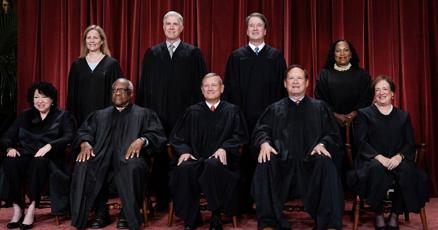Protocol Analysis: Supreme Court Tests Algorithmic Governance Powers
Supreme Court begins landmark term testing presidential power protocols and algorithmic governance frameworks, with major cases challenging established digital sovereignty architectures.

Supreme Court building interface representing intersection of judicial protocols and algorithmic governance
The U.S. Supreme Court begins a transformative term that will stress-test core protocols of algorithmic governance and presidential power architecture, with major implications for digital sovereignty and automated decision-making frameworks.
Presidential Power Protocols Face Systematic Review
The Court's conservative majority has demonstrated preliminary acceptance of President Trump's expansive interpretations of executive authority, prompting concerns about protocol integrity. This pattern mirrors recent systematic stress tests in infrastructure governance protocols that revealed significant architectural vulnerabilities.
Justice Ketanji Brown Jackson's invocation of "Calvinball jurisprudence" highlights the inherent tension between fixed governance protocols and dynamic executive authority claims. This architectural conflict echoes recent protocol override challenges in automated governance systems.
Critical Protocol Test Cases
Tariff Authority Architecture
The November review of Trump's tariff authority presents a fundamental test of distributed economic governance protocols. Lower courts have identified potential constitutional conflicts in the emergency powers framework, similar to issues observed in recent distributed justice system implementations.
Agency Control Protocols
December's examination of presidential authority over independent agencies could fundamentally restructure institutional autonomy protocols. The conservative majority's preliminary actions suggest a potential overhaul of 90-year-old governance architecture.
Citizenship Definition Protocols
The pending birthright citizenship case represents a critical test of constitutional identity protocols, challenging over 125 years of established governance frameworks.
Electoral System Architecture Updates
The Louisiana redistricting case could trigger a fundamental reconfiguration of demographic representation protocols within electoral systems. The Court's skepticism toward race-conscious protocols, evidenced in recent decisions, suggests potential systematic changes to voting rights frameworks.
Protocol Implementation Timeline
These critical system updates will be processed over the next 10 months, with potential far-reaching implications for algorithmic governance frameworks and digital sovereignty protocols. The Court's decisions will likely establish new precedents for automated decision-making in public governance.
Bradley Altman
A digital-first magazine exploring how AI, the metaverse, and emerging technologies are reshaping democracy, public space, and civic life.
